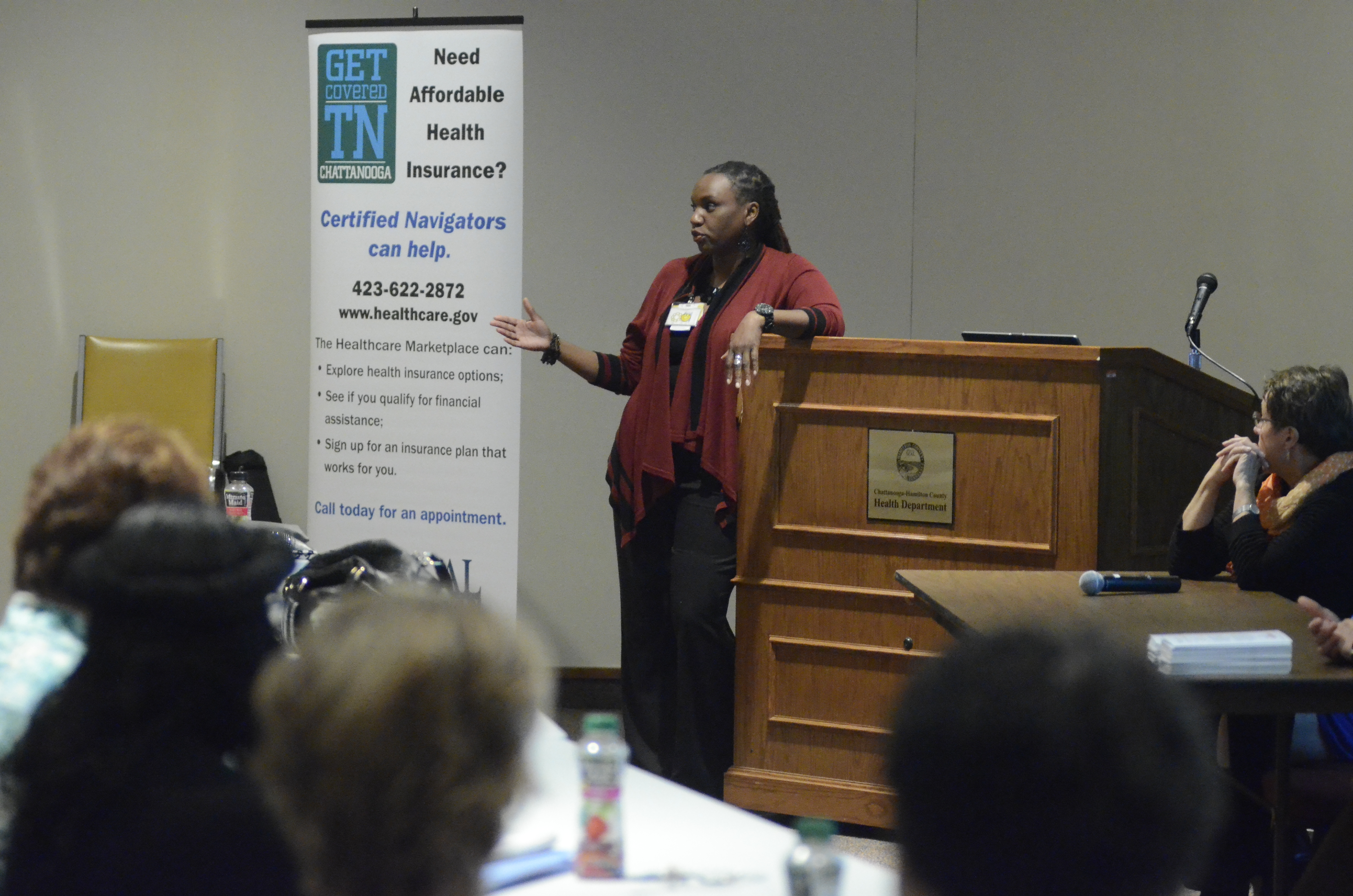PLAN CHANGESBelow are monthly premium price increases for a few exchange plans in the Chattanooga regionBlueCross BlueShield of Tennessee26 Year old, Silver plan, Network E2014 - $144.372015 - $173.1240 Year old, Silver plan, Network E2014 - $180.182015 -$216.07Cigna26 Year old, Silver plan2014 - $228.902015 - $249.7640 Year old, Silver plan2014 - $288.482015 - $317.56Sources: BlueCross BlueShield of Tennessee, Tennessee Dept. of Commerce and Insurance
This time last year, the rollout of the Affordable Care Act was looking anything but smooth: HealthCare.gov was not working. A bitterly polarized government was emerging from a two-week shutdown. Insurance "navigators" were still learning the new system themselves.
"Last year's enrollment was barely controlled chaos," said Rae Bond, director of the Chattanooga Medical Foundation, the largest local navigator group. "Everyone acknowledged there were really significant problems."
But with that "trial-by-fire" period under their belts, navigators, insurance companies and shoppers all say they feel far more confident on the eve of the next ACA open enrollment period, which begins at midnight tonight and lasts until Feb. 15.
Chattanooga insurance shoppers should expect plenty of changes during Obamacare enrollment Round Two: New insurers; dozens more plan options; premium increases on last year's plans; the possibility of auto-renewal; and much higher tax penalties if they choose to opt out of insurance altogether.
The plans on the exchange are designed for people who do not have insurance through an employer, Medicaid or Medicare. Roughly 8,000 people in Hamilton County signed up for plans on the exchange during the last open enrollment. Federal officials expect fewer people nationwide to sign up for coverage this year. But Chattanooga navigator groups say they hope to surpass their numbers from last year, pointing to 17,000 uninsured Hamilton County residents.
"The good news is in the last year, we have learned an enormous amount about what works," said Bond. "We have already hit the ground running."
NEED HELP?Navigators and certified application counselors are like "shopping assistants." To receive free assistance from certified Navigators consumers need to bring proof of identity, have social security numbers and birth dates for all members in the household, and proof of income.Here are some helpers in the Chattanooga area:Medical Foundation of Chattanooga - 1917 E. Third Street, 423-622-2872Southside Community Health Center - 100 E. 37th Street, 423-778-2700Dodson Avenue Community Health Center - 1200 Dodson Ave., 423-778-2800ENROLLMENT EVENTSSat., Nov. 15 - New Covenant Fellowship, Chattanooga -10 a.m.-2 p.m.Tues., Nov. 18 - Collegedale Library, 9318 Apison Pike, Ooltewah - 4 p.m.-7 p.m.Thurs., Nov. 20 - Clyde Roddy Library, 371 1st Avenue, Dayton - 4 p.m.-7:30 p.m.Sat., Nov. 22 - Jasper Public Library, 14 W. Second Street, Jasper - 9 a.m.-2 p.m. (CST)Dec. 6 - Cleveland Public Library, 795 Church Street NE, Cleveland - 10 a.m.- 2 p.m.Dec. 9 - Polk County Public Library, 126 Polk Street, Benton - 4 p.m.-7 p.m.
They have to. Compared to the six-month enrollment last year, this window will be tight: just 13 weeks - three of which are big holiday weeks.
But federal officials say they don't expect the same massive bottleneck that came with HealthCare.gov's botched launch last year. And the website itself should be much easier to use this time around, insurers and brokers say.
This time, the site allows for "window shopping," which lets people preview plans simply by entering their age, ZIP code, family size and estimated income.
But even if there are website problems, local brokers say they have created work-arounds. American Exchange, a Chattanooga broker that specializes in ACA marketplace coverage, has set up software to allow itself to bypass HealthCare.gov to access federal data hubs.
"Last year was more of a learning experience for us, as it was for everyone," said Andrew Hetzler, COO of the company. He expects people who held off because of all of the questions and controversy last year to show more interest this time around.
And the federal insurance mandate means they have less wiggle room. It was somewhat painless to opt out of having health coverage last year, since the tax penalty was only $95 per person. But this year, that spikes to $325, and $975 per family - or up to 2 percent of a family's income.
MORE PLANS, HIGHER PREMIUMS
Early this year, Cleveland, Tenn., resident Kayla Leeper went through American Exchange to buy a BlueCross plan on the marketplace.
Leeper, a 27-year-old food service worker, likes the plan. It's affordable, and it includes all her doctors. And she wants to keep it. But she's waiting to see what the prices will look like this time around.
"I'm going to shop around and make sure there isn't anything that doesn't make more sense," Leeper said. "But if the premiums don't go up too much, I will probably just keep it."
Starting this week, people who bought plans on the exchange last year will get renewal notices in the mail. If they do not take any action, the plans will auto-renew. But navigators encourage last year's buyers to shop again.
"What was the best choice last year may not be the best choice this year," Nancy Ridge, a navigator with the Medical Foundation of Chattanooga, told advocacy groups at a briefing on Wednesday. "We want people to be smart shoppers."
For one thing, there will be more dozens more plans to choose from. In North Georgia, Blue Cross Blue Shield of Georgia and Alliant Health will be joined by UnitedHealthcare and Assurant Health. And in East Tennessee, Cigna and BlueCross BlueShield of Tennessee - the latter of which dominated Tennessee's market last year by taking 88 percent of all signups - also will face more competition.
Both Assurant Health and health insurance co-op Community Health Alliance will offer plans on the local exchange this year. And while BlueCross offered some of the lowest-priced plans in the country last year, CHA is offering some of the region's cheapest plans this round.
Meanwhile, BlueCross and Cigna are raising premiums on the plans they offered last year. Officials with the Tennessee Department of Commerce and Insurance have granted BlueCross' request to increase premiums on the exchange by an average of 19 percent, along with Cigna's request to raise premiums 7 percent.
BlueCross officials say premium increases need to be looked at on a case-by-case basis. For example, a BlueCross Silver-level Network E plan for a 26-year-old has gone up from $144.37 a month to $173.12 a month, while such a plan for a 40-year-old will go up from $173.12 to $216.07.
Those prices don't factor in tax credits, which are set up to help people pay for the premiums, depending on a shopper's income and household size. And those tax credits are an important factor to consider when it comes to premium increases - since the tax credits may cushion a consumer from feeling any effect from a price hike or, conversely, be less than what they received last year.
BlueCross officials say they underpriced plans last year, and that most of the people who purchased them were older and had health conditions. Because BlueCross did not sign up enough young, healthy people those costs were not balanced out.
"We were way under where we needed to be," said Carla Raynor, BlueCross' vice president of strategic marketing. "We're trying to make this year's plans more reasonably priced for the market."
Meanwhile, Cigna spokeswoman Amy Turkington said the company's 2015 pricing "reflects our customers' 2014 early clinical experience and claims payments, enrollment mix" and other factors.
While premiums are usually the price point insurance shoppers look at first, they also need to consider factors like deductibles, co-payments and cost-sharing.
And the most important factor, say navigators and insurers, is the actual network the plan covers. If shoppers want to keep a particular doctor or hospital, they need to make sure they buy a plan that includes them. While CHA plans may be cheaper this year, they will have narrow networks and they cannot be used out of state, Hetzler said.
Contact staff writer Kate Harrison Belz at kbelz@timesfreepress.com or 423-757-6673.


